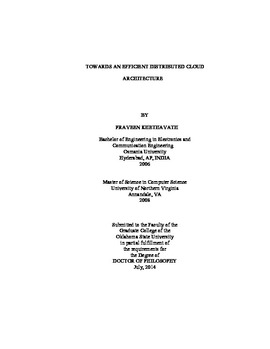| dc.contributor.advisor | Thomas, Johnson P. | |
| dc.contributor.author | Khethavath, Praveen | |
| dc.date.accessioned | 2015-06-17T20:06:34Z | |
| dc.date.available | 2015-06-17T20:06:34Z | |
| dc.date.issued | 2014-07 | |
| dc.identifier.uri | https://hdl.handle.net/11244/14934 | |
| dc.description.abstract | Cloud computing is an emerging field in computer science. Users are utilizing less of their own existing resources, while increasing usage of cloud resources. There are many advantages of distributed computing over centralized architecture. With increase in number of unused storage and computing resources and advantages of distributed computing resulted in distributed cloud computing. In the distributed cloud environment that we propose, resource providers (RP) compete to provide resources to the users. In the distributed cloud all the cloud computing and storage services are offered by distributed resources. In this architecture resources are used and provided by the users in a peer to peer fashion. We propose using multi-valued distributed hash tables for efficient resource discovery. Leveraging the fact that there are many users providing resources such as CPU and memory, we define these resources under one key to easily locate devices with equivalent resources. We then propose a new auction mechanism, using a reserve bid formulated rationally by each user for the optimal allocation of discovered resources. We have evaluated the performance of resource discovery mechanisms for the distributed cloud and distributed cloud storage and compared the results with existing DHTs, peer to peer clients such as VUZE and explored the feasibility and efficiency of the proposed schemes in terms of resource/service discovery and allocation. We use a simultaneous Auction mechanism and select a set of winners once we receive all contributions or bids. In a real world scenario, users request resources with multiple capabilities, and in order to find such resources we use a contribution mechanism where service providers will provide a contribution price to users for providing a resource. Users use our proposed auction mechanism to select the resources from the set of resource providers. We show that Nash equilibrium can be achieved and how we can avoid the problem of free riders in the distributed cloud. Network latency is an important factor when deciding which resource provider to select. We used treeple a secure latency estimation scheme to obtain network measurements in distributed systems. We developed a mobile application using distributed cloud which preserves privacy and provides security for a user. Distributed cloud is used for developing such an application where all the data needs to be close to the users and avoids single point of failure, which is the problem with existing cloud. | |
| dc.format | application/pdf | |
| dc.language | en_US | |
| dc.rights | Copyright is held by the author who has granted the Oklahoma State University Library the non-exclusive right to share this material in its institutional repository. Contact Digital Library Services at lib-dls@okstate.edu or 405-744-9161 for the permission policy on the use, reproduction or distribution of this material. | |
| dc.title | Towards an efficient distributed cloud architecture | |
| dc.contributor.committeeMember | Chan-Tin, Eric David | |
| dc.contributor.committeeMember | Kak, Subhash C. | |
| dc.contributor.committeeMember | Gade, Mary N. | |
| osu.filename | Khethavath_okstate_0664D_13539.pdf | |
| osu.accesstype | Open Access | |
| dc.type.genre | Dissertation | |
| dc.type.material | Text | |
| dc.subject.keywords | cloud computing | |
| dc.subject.keywords | dht | |
| dc.subject.keywords | distributed cloud | |
| dc.subject.keywords | game theory | |
| dc.subject.keywords | mobile payments | |
| dc.subject.keywords | resource allocation | |
| thesis.degree.discipline | Computer Science | |
| thesis.degree.grantor | Oklahoma State University | |
